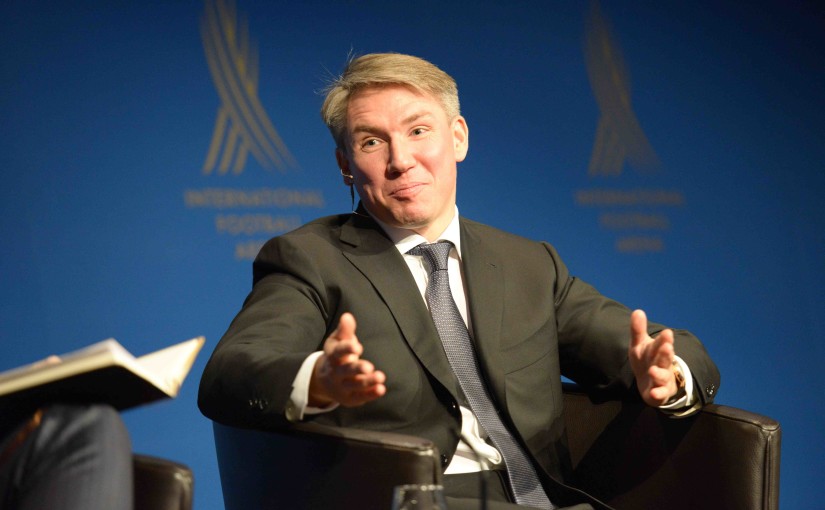By Andrew Warshaw in Geneva
September 20 – Four months after the embarrassment of its most powerful sports supremo being blocked from keeping his place at FIFA’s top table, Russia regained its influence in world football politics today when Alexei Sorokin was elected to FIFA’s ruling Council until 2021.
Sorokin, CEO of the 2018 World Cup organising committee, replaces Vitaly Mutko, Russia’s deputy prime minister, who famously failed an eligibility test earlier this year because of a clash between his sporting and political interests.
As a result of Mutko’s ineligibility, UEFA was forced to hold a one-off special election in Geneva, bringing together all its 55 member federations – presumably at considerable expense – for an extraordinary congress that lasted less than two hours.
Mutko’s candidacy was blocked by FIFA’s then governance committee chairman Miguel Maduro who was ousted by FIFA only weeks after the ruling.
Maduro revealed last week that pressure had been put on him to protect Mutko’s position. FIFA of course denied this but it was no surprise that FIFA president Gianni Infantino, keen to have the next World Cup hosts back in his inner circle, was all smiles when Sorokin’s election (by acclamamation since he was the only candidate) was formalised . “I am very happy,” Infantino was quoted by Tass.
Sorokin became the eighth of Europe’s nine delegates on the 37-member FIFA Council. The ninth was vacated in July when Spanish football boss Angel Maria Villar, one of last remaining members of FIFA’s old guard, resigned as a vice president of both FIFA and UEFA after being arrested over allegations of corruption.
Villar’s replacement on the FIFA Council was to be confirmed later Wednesday at a meeting of the UEFA executive committee which was to be followed by a press conference with UEFA president Aleksander Ceferin.
Today’s extraordinary congress also rubber-stamped bringing European Club Association head Andrea Agnelli of Juventus on to the UEFA executive committee along with Arsenal’s Ivan Gazidis, both with full voting rights. It also agreed to change the relevant UEFA statutes to allow for Europe’s major leagues to also have a voice on the exco, with European Professional Football Leagues chairman Lars-Christer Olsson expected to be given the role when his organisation meets next month.
Gazidis refuted suggestions that with David Gill already on the UEFA exco, England had an unfair advantage when it came to representation at UEFA’s top table. “As an ECA representative, I am not representing England,” said Gazidis. “The European clubs is the voice Andrea and I will be exercising.”
Contact the writer of this story at moc.l1751315456labto1751315456ofdlr1751315456owedi1751315456sni@w1751315456ahsra1751315456w.wer1751315456dna1751315456

